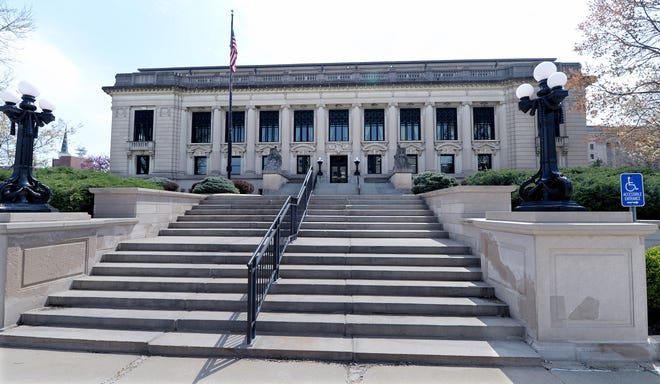

The Illinois Supreme Court ruled Tuesday that a major criminal justice reform law is constitutional, allowing the state to become the first in the nation to end cash bail as a condition of pretrial release − a provision that has triggered debate on racial inequality and crime.
The elimination of Illinois’ cash bail system was part of a controversial criminal justice overhaul adopted in 2021 known as the SAFE-T Act, a measure that had seeking to transform the state’s criminal justice system after the murder of George Floyd and other police killings.
In a 5-2 decision, the state’s high court overturned a lower court’s opinion in December that a provision in the act doing away with cash bail violated the state constitution’s requirement that “all persons shall be bailable by sufficient sureties.”
“The Illinois Constitution of 1970 does not mandate that monetary bail is the only means to ensure criminal defendants appear for trials or the only means to protect the public,” the majority stated in its opinion. “Our constitution creates a balance between the individual rights of defendants and the individual rights of crime victims. The Act’s pretrial release provisions set forth procedures commensurate with that balance.”
The provision, which had been set to take effect Jan. 1, was postponed while the Supreme Court weighed an appeal from Attorney General Kwame Raoul. It will now take effect on Sept. 18.
Although judges will no longer be able to impose cash bail conditions, they can decide to detain defendants if they pose a risk of committing more offenses or fleeing prosecution.
Cash bail reform:60% of people awaiting trial can’t afford bail. A civil rights commission can’t agree on reform.
Controversial provision sparks debate
Supporters of eliminating cash bail say it creates disparities in treatment by the criminal justice system because the wealthy can pay their way out of jail while they await trial but low-income defendants have to wait behind bars.
Gov. J.B. Pritzker said the new system will “ensure pretrial detainment is determined by the danger an individual poses to the community instead of by their ability to pay their way out of jail.”
The bail reform was also strongly endorsed by the Illinois Supreme Court Commission on Pretrial Practices in 2020, which noted that defendants who can’t afford bail often face other difficulties, including loss of a job, loss of child custody or inability to access immediate health care.
In his appeal, Raoul had argued ruling against the law would have opened the doors to overturning decades of criminal justice reform led by the state Legislature.
“The SAFE-T Act was intended to address pervasive inequalities in the criminal justice system, in particular the fact that individuals who are awaiting criminal trials – who have not been convicted of a crime and are presumed innocent – may spend extended periods of time incarcerated because they cannot afford to pay cash bail,” he said in a statement. “The law ensures that the decision about whether people are detained pending trial is not based on whether they can afford to pay for their release.”
Opponents have said bail ensures defendants released from jail show up for court proceedings. They also warned that criminals who are released while awaiting trail will be able to commit other crimes.
“The court ignored the pleas of nearly every prosecutor in the state of Illinois, Democrat and Republican, that the elimination of cash bail will put dangerous criminals back on the street,” the Illinois Fraternal Order of Police said in a statement. “Today’s ruling is a slap in the face to those who enforce our laws and the people those laws are supposed to protect.”
Ruling only affects cash bail provision
Raoul clarified that the ruling did not apply to other parts of the SAFE-T Act, which also modified police use of force and required the use of body-worn cameras.
The ruling applied only to the Pretrial Fairness Act portion − the most debated part of the measure, which raised questions about when and for which offenses judges would be allowed to keep defendants confined pending trial. State lawmakers amended the law in late 2022, giving judges wider authority to detain offenders.
Despite the changes, county prosecutors and sheriffs filed suit alleging the law was unconstitutional. A Kankakee County judge ruled in their favor, saying that because the state constitution mentions “bail,” it would take a constitutional amendment approved by voters to make such a change. But the state Supreme Court overturned the ruling.
More:Illinois set to become first state to eliminate cash bail under sweeping criminal justice reform law
Illinois first state to abolish cash bail
Though other states have enacted cash bail changes, Illinois is the first state to eliminate it.
In 2014, New Jersey replaced its cash bail system with a risk assessment approach in which judges consider community safety and whether a defendant poses a threat before deciding to detain or release the defendant before trial. But there are some exceptions where cash bail is still allowed.
Other states have also implemented similar changes, including New York and Alaska.
Contributing: The Associated Press
Patrick Keck can be reached at [email protected] or on Twitter @pkeckreporter.






